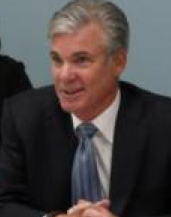
Black teachers: How to recruit them and make them stay

Lessons in higher education: What California can learn

Keeping California public university options open

Superintendents: Well-paid and walking away

The debt to degree connection

College in prison: How earning a degree can lead to a new life

The formal letter from Washington hasn’t arrived, but the verdict has: The federal Department of Education has turned down California’s application for a waiver from the No Child Left Behind law.

State Superintendent of Public Instruction Tom Torlakson
“It is disappointing that our state’s request – which enjoyed such strong support from parents, teachers, administrators, and education advocates across California – has apparently been rejected,” Superintendent of Public Instruction Tom Torlakson said in a press release Friday.
Thirty-three states and the District of Columbia have already received waivers, liberating them from NCLB’s chief demand – 100 percent proficiency of all students in English language arts and math by 2014 – and the sanctions that come with failing to meet it. These states also now have flexibility to spend a portion of federal Title I dollars that had been restricted to NCLB compliance. An additional 10 states have waiver applications pending.
The rejection of California’s application was not unexpected. Gov. Jerry Brown, Torlakson and the State Board of Education had chafed at some of U.S. Education Secretary Arne Duncan’s requirements, and had filed a waiver request that ignored them. Among their objections: the requirement of a statewide teacher evaluation system that includes the use of standardized test data. State officials applied for a waiver under a different section of the law that they claimed gave Duncan authority to grant permission.
What was surprising was how long it took for a decision: California sent in its application in June. State education officials learned of the rejection in conversations with federal education administrators, Paul Hefner, Torlakson’s spokesman, said.
President Obama and Duncan announced in the fall of 2011 that they would consider granting waivers because of the failure of Congress to fix or replace NCLB, officially known as the Elementary and Secondary Education Act. With a sharply divided Congress no closer now to reaching an agreement, states with waivers are free to devise their own accountability plans to fix lowest-achieving schools and narrow the achievement gap.
Without a waiver, the number of California schools and districts facing penalties for failing to meet NCLB’s proficiency targets will continue to rise. Currently 70 percent of schools receiving federal Title I money – 4,402 out of 6,209 schools – are in Program Improvement, the designation for being out of compliance. Torlakson and State Board of Education President Michael Kirst have sharply criticized No Child Left Behind’s accountability demands. In a letter sent to superintendents and heads of charter schools on Friday, they implied that California will take the path of least resistance to federal sanctions, focusing instead on the state’s effort to revise its own accountability system, using the Academic Performance Index. “While we await direction from ED (Department of Education) on new requirements for federal accountability, California will continue to use the API as the key indicator in determining whether the school or LEA (district) has made adequate academic progress.”
Nonetheless, the denial of a waiver will have consequences. Schools in Program Improvement must continue to notify parents annually that they can transfer their children to another school, and they must continue to set aside 20 percent of Title I money for student tutoring and transporting students to schools of their choice. There are also restrictions on 10 percent of Title I dollars that must be used for teacher training. With a state waiver, districts would have flexibility to use this money, which totals $353 million statewide, according to the state Department of Education.
In his statement, Torlakson said, “Based on a thorough examination of federal and state law, California made a good-faith effort to seek relief from requirements that even federal officials have acknowledged time and again are deeply flawed.”
One group that praised the rejection by the feds is StudentsFirst, a Sacramento-based advocacy group created by former Washington, D.C., chancellor of schools Michelle Rhee, which favors the substantial use of test scores with teacher evaluations. “If Supt. Torlakson’s statement is accurate, the Obama administration is correctly poised to deny California’s petition because legislators and defenders of the status quo refuse to create the appropriate learning environment so that every kid is given a chance to succeed,” its statement said Friday. “Further, by submitting an inadequate application, California has precluded the ability of school districts and schools to be flexible and innovative with millions in federal funds.”
Duncan has said that he might consider granting a waiver to districts in states whose waivers are turned down, as long as the districts meet the criteria, including evaluation systems. Among those that will now press Duncan to move forward with the idea are the eight unified districts that have come together under the umbrella of the nonprofit California Office to Reform Education (CORE). Its members include Long Beach, Los Angeles, San Francisco, Oakland, Sacramento City and Fresno. Fresno Unified Superintendent Michael Hanson said last night, “We’re hopeful the Department of Education will consider NCLB waivers at the district level through consortiums like CORE.”

Panelists discussed dual admission as a solution for easing the longstanding challenges in California’s transfer system.

A grassroots campaign recalled two members of the Orange Unified School District in an election that cost more than half a million dollars.

Legislation that would remove one of the last tests teachers are required to take to earn a credential in California passed the Senate Education Committee.

Part-time instructors, many who work for decades off the tenure track and at a lower pay rate, have been called “apprentices to nowhere.”
Comments
Comments Policy
We welcome your comments. All comments are moderated for civility, relevance and other considerations. Click here for EdSource's Comments Policy.